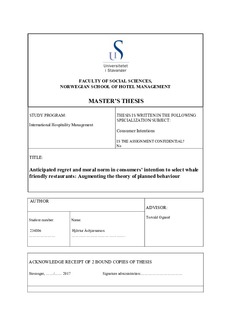| dc.contributor.advisor | Øgaard, Torvald | |
| dc.contributor.author | Asbjarnarson, Hjörtur | |
| dc.coverage.spatial | Iceland | nb_NO |
| dc.date.accessioned | 2017-09-15T09:15:32Z | |
| dc.date.available | 2017-09-15T09:15:32Z | |
| dc.date.issued | 2017-06-15 | |
| dc.identifier.uri | http://hdl.handle.net/11250/2454820 | |
| dc.description | Master's thesis in International Hospitality Management | nb_NO |
| dc.description.abstract | This study uses the theory of planned behaviour (TPB) to examine the impact of anticipated regret and moral norm on intention to select whale friendly restaurants. The predictive power of the original theory and the predictive abilities of these two additional constructs are evaluated. A questionnaire that included the measures of attitudes, subjective norm, perceived behavioural control, anticipated regret and moral norm was adapted from previously validated measures for this study. This questionnaire was completed by 253 people who had gone whale watching in Iceland during the spring of 2017. Iceland is one of few places where commercial whaling and whale watching takes place at the same time. Whether these two industries can coexist has often been discussed, and many consider them to be incompatible forms of whale consumption. The whale watching industry in Iceland has grown extensively in recent years despite the national stance on whaling, and whale watching is now one of the most sought after tourist activities to partake in when visiting Iceland. Multiple regression analysis revealed that for the selection of whale friendly restaurants, the positive aspects of moral norm and the negative aspects of anticipated regret both added significantly to the prediction of intention. The original TPB variables also proved to be strong significant predictors of intention in this study. The findings of this study suggest that decision-making models such as the TPB can benefit from incorporating aspects of anticipated emotions and moral concerns. Furthermore, the results of this study provide insight into the decision-making processes of whale watchers as consumers, which can prove to be beneficial for the development of marketing and advertising strategies in the restaurant and whale watching context. | nb_NO |
| dc.language.iso | eng | nb_NO |
| dc.publisher | University of Stavanger, Norway | nb_NO |
| dc.relation.ispartofseries | Masteroppgave/UIS-SV-NHS/2017; | |
| dc.subject | reiselivsadministrasjon | nb_NO |
| dc.subject | consumer intentions | nb_NO |
| dc.subject | theory of planned behaviour | nb_NO |
| dc.subject | whale friendly | nb_NO |
| dc.subject | tourism | nb_NO |
| dc.subject | turisme | nb_NO |
| dc.subject | Island | nb_NO |
| dc.subject | hvalsafari | nb_NO |
| dc.title | Anticipated regret and moral norm in consumers’ intention to select whale friendly restaurants: Augmenting the theory of planned behaviour | nb_NO |
| dc.type | Master thesis | nb_NO |
| dc.subject.nsi | VDP::Samfunnsvitenskap: 200::Økonomi: 210 | nb_NO |
